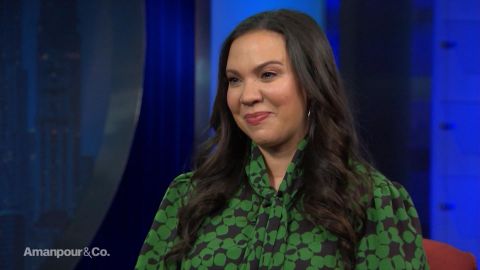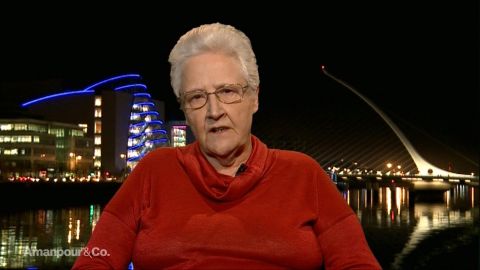Read Transcript EXPAND
CHRISTIANE AMANPOUR: Now though, we’re taking a very different turn and we’re going to focus on culture with a T.V. series that’s brimming with a much-needed warmth. The critically acclaimed “One Day at a Time”, a remake of Norman Lear’s ’70s sitcom but with a Latin twist. It follows a family going through their lives, well, one day at a time. And it stars Latin legends like the Oscar-winning star of West Side Story Rita Moreno. The brains behind the show producer, Gloria Calderon Kellett, tells our Alicia Menendez how she got her show off the ground.
ALICIA MENENDEZ: A few years ago, Norman Lear, legendary producer of shows like All in the Family, Sanford and Sons, The Jeffersons, gives you a call and says, “I want to reboot my show with a Latino family, One Day at a Time.” Do you think it was a good idea?
GLORIA CALDERON KELLETT, EXECUTIVE PRODUCER, ONE DAY AT A TIME: I did not think it was a good idea at first. I mean look, I thought it was a good idea in theory. And to be clear, Norman didn’t call me, his people, because he doesn’t have to call me. If somebody says Norman Lear wants to meet with you, you go, yes, please. So I told him — I sat down with him and he — the first 30 minutes, I can tell you what happened because you’re just in awe of this legend that you’re sitting with. And then he is so disarming, and so just salt of the earth kind of guy, and really really interested in people. Even at 97-years-old, he’s still curious. And he was asking me all these questions and finally he said, you know we’re thinking about doing a show and what do you think. And something in me was like I don’t know if you should do it because — why? I said because we’re a very hard audience. People are constantly trying to get that Lennox audience and we’re very different. But then very similar but very proud of our differences and very proud of our similarities. And I think there’s sort of this panel, the next thing that has happened that people try to appeal to all of us, and it makes all of us feel a little upset. And he goes, “Well, what would you do?” And I said, well, I would just be super, super, super specific about my personal truth of what it is to be right next on the West Coast, Cuban American, it’s very specific, right? Different than someone — even different than Cubans in mid-America or East Coast. And I told him about my family and told about my mom and dad and their journey as (INAUDIBLE) kids coming to this country in 1962. And he just said, “Well, let’s do that. Let’s do that show.”
MENENDEZ: And you were convinced?
KELLETT: Oh, yes, yes. Yes, I was convinced. I said OK, let’s do it. Let’s do it. And Mike Royce is wonderful. Mike Royce was already attached to the project and the three of us sat down and it was just — the alchemy of the moment just was magical.
MENENDEZ: I mean you’ve worked in almost every writers’ room in Hollywood. Mythology.
KELLETT: Yes.
MENENDEZ: Most people know you from How I Met Your Mother.
KELLETT: Yes.
MENENDEZ: Can any of that experience really prepare you for running a show?
KELLETT: A thousand percent, yes. All of those rooms taught me different things. I had some great showrunners, some not great showrunners. Some people that were great with actors. Some people that did not like interacting with actors. Some people that were great with editing. So I got to piece together I like this, I don’t like this. It was a salad bar of take this and take that of 12 years of salad barring. And then finally, I was like I know how to make a salad. That’s how it came together.
MENENDEZ: But you have done everything on this show as well. I mean in addition to running the show, you’re a producer, you were a writer on this show, you’re director. In this season, you were acting in the show. Let’s take a look.
(BEGIN VIDEO CLIP)
VICTOR: Hey.
ELENA: Hey, Papi.
ALEX: Hey, Papi.
VICTOR: Hey. Wow. Looking good, Lupe.
PENELOPE: Thank you.
VICTOR: So is the place — hey. Ugly pillow in the closet?
LYDIA: You know it.
PENELOPE: So you look good too. Yeah. Where’s baby? I mean Blondie. I mean, your girlfriend.
NICOLE: Hi.
PENELOPE: Hi.
ALEX: Oh, wow. Dang. Papi’s got a type.
(END VIDEO CLIP)
MENENDEZ: It is so tricky to see you and Justina Machado look that much alike. I didn’t know hair made such a big difference.
KELLETT: I know. Well, when we’re hanging out together, people are like, “Are you guys sisters? Are you guys related?” Because we’re the same height, same weight, same, you know, like — she’s thinner. I should point that out. I should point that out for her. But it’s something that we get all the time. And we love each other so much [13:45:00] that the writers were like, “You should play Nicole this season. You should play. We should put you in a week.” And once I put that weight on, it was madness. People kept on confusing us and it was really fun.
MENENDEZ: There are a lot of serious topics that you had on the show and we’ll get to that in a second but the show really is a celebration of our joy. And I wonder why that was important to you to put that front and center.
KELLETT: So many reasons. I mean look, the main reason is that’s my family. My family is a special bunch of people. Everything is joy-filled in my life and I’m really blessed in that way. But also, I feel like the lack of representation on television for Latinos that are happy and joyful and living a great, fun, happy, prosperous life is limited. And so to be able to put that out there, you’re always seeing suffering mother, you’re always seeing gang bangers and gang violence. And I just wanted to also show the other side that the narrative of the Latinx right now in this country is very skewed to sort of one story and I feel like we’ve exhausted that story. I am so much more interested in the people that I grew up around my whole life. And that story is just not being reflected right now and it, in turn, really affects society’s view of who we are as people. So I really felt like — I didn’t mean to be telling these stories that would have such political influence. It doesn’t seem political to me. It just seems like this is the truth and telling the truth right now seems to be a political act.
MENENDEZ: I think for a lot of us who get into media who did not see ourselves reflected back to us in our youth. I often say Steve Urkel was the character on television who most reminded me of myself growing up because he was from a minority group and he was a nerd. That has changed but so too has my perception of what real power looks like, that it’s no longer enough to see the reflection back. It’s no longer enough to see the story told. I now understand it is important that the people who are making decisions about what gets on air and what gets resources understand the value of that experience and that diversity.
KELLETT: Absolutely. This is why I’m on the 5050by2020 advisory board because Jill Soloway was very adamant about the leadership in arts and entertainment being accountable to how women and people of color behind the scenes. These are the tastemakers. These are the people making decisions about what you see, what everyone sees. And women and people of color, in particular, have really been led down a path that is inaccurate to who we are and it affects too much. So the stories become entertaining but also have a little broccoli, right, a little sugar to get that medicine down, changing the narrative so that it’s more reflective of what this country looks like and sounds like and does.
MENENDEZ: What’s so interesting for you is that’s long been a hallmark of Norman Lear’s programming, really getting out the sociocultural issues. I want to take a look at another clip from the show.
(BEGIN VIDEO CLIP)
PENELOPE: I hate to admit it but I feel sorry for men. This consent thing is tricky.
ELENA: No. Women always blame themselves and then the man never has to take responsibility. During Rape Prevention Week at school, all the signs are aimed at women. Girls, don’t dress provocatively. Girls, don’t walk alone. How about, hey, guys, don’t rape?
ALEX: Oh, my God. Why are we talking about that? I took a couple pictures as a joke and Chloe thought it was funny.
ELENA: Did she? Or did she feel like she he had to laugh because she didn’t know what else to do with your hand on her boob?
PENELOPE: OK, Elena. Take it easy.
ELENA: No. He thinks what he did is cute. You’re basically a predator.
ALEX: You’re basically a psycho.
PENELOPE: Wow, you two.
ELENA: Good, call me crazy for defending a woman’s right not to be groped.
ALEX: Elena, you’re just mad because the Internet told you to be. You don’t know my life. You don’t even leave this apartment.
ELENA: Because of guys like you.
(END VIDEO CLIP)
MENENDEZ: How do you craft that conversation in a way that is authentic and stops short of feeling like an after-school special?
KELLETT: You know that’s the challenge. I mean we really try to be as honest and truthful as we can when we take a lot of conversations for the room. The writers’ room, you know one of our writers, Michelle Badillo is who told us like she was talking about rape prevention week in college. And she’s the one that made that wonderful. Like it’s always geared towards women. And it never really occurred to me until that moment. And so then we start talking about it in the room and some of the guys were like, “Is this going too far?” No, because of — we all get fired up in our conversations. Because really after all this has happened, I’m — where do we go from here knowing that this is around us raising kids? Like I’m raising kids. I’m raising a daughter and son. Mike raises — is raising a daughter and a son. What do we say to them about how to behave, how to act? It seems like we’re telling our women speak up, be empowered. What are we telling our boys? So it was such a great opportunity with Alex to be able to see him doing something that is maybe a little innocuous and bad, but where in that point is he told stop, where other men were not and it snowballed. So can we take an opportunity to have a conversation with this guy and also have Schneider go through his own revelatory thinking of, “Oh my, God. Have I been a part of this?” because that’s also been interesting. A lot of the men in the writers’ room were like, “I mean there were times when I went out with a girl and she said nothing was going to happen then something happened. Am I complicit?” So it was those conversations that were so interesting to me. So it’s — let’s just do this. Let’s just do this and see where it comes from and where do we get to the other side, where is the redemption.
MENENDEZ: It must mean you also have a lot of trust in that writers’ room.
KELLETT: Yes. These are all wonderful people. Mike Royce and I, we got so lucky with this group of people. We read a good zillion writers and we tried — you know, it’s a real — it’s a really specific puzzle you have to put together when putting together a writers’ room. You want a bunch of different voices, some joke people, some story people, character people. And then over time, you get really, really comfortable hopefully so that people can share and be vulnerable. It’s vulnerable to admit your failings and your successes.
MENENDEZ: We talk a lot about a changing America and how that is reflected back to us in media. But part of what is changing is our consumption habits. And sometimes when I watch One Day At A Time, I wonder could this show exists on broadcast.
KELLETT: Interesting. I think it could. It would be a lot shorter because broadcast is 22, sometimes 20 I’m hearing now, 20, 21 minutes. We get 26 to 28.
MENENDEZ: Luxurious.
KELLETT: Luxurious which is a B story or a C story or a lingering look or a quiet moment which you don’t get a lot on network because there’s no time. You really have to kind of fight for those jokes. So the time, that would be the biggest thing that would be difficult. But in terms of the topics that we talk about, this is the stuff like you said that Norman was doing in the ’70s. Although he told me a funny story that CBS had done a retrospective of him and had called him up and said, “What are your favorite clips so we can add it to this retrospective?” And some of his clips they cannot air now.
MENENDEZ: What?
KELLETT: Standards and practices could not air now. Sounds like what?
MENENDEZ: So great.
KELLETT: Isn’t that amaze — that’s how groundbreaking Norman Lear was.
MENENDEZ: Now, you just want to watch him montage —
KELLETT: I know. I know.
MENENDEZ: Your show is now back on the air. And Netflix which is a streaming service evaluates in a very short period of time whether or not they believe that a show has been a success. What does that mean for you as a creator and what does that mean for us as consumers?
KELLETT: Well, the beauty of Netflix is the creative process is unlike any other we’ve experienced anywhere. They are so supportive. They let us make the show that we want to make. Their notes are thoughtful. I mean it’s painful for writers to say that executive notes are thoughtful and great. They are. So the creative process is incredible. Once you put it out into the world, then they have all these ways of evaluating it that we don’t know. So all we know are the numbers. All we know are the phone calls where they say, “We wish more people were watching” or “Not as many people watched as we hoped” and we don’t know what the cost-benefit analysis that they’re looking at is. So we — at the first season, we kind of said nothing, we’re like what do we do? And then last year, I was like no, I love this too much. I love these people too much. I’m just going to let the Internet know, “Hey, if you want to help us out and you love the show, don’t like watch it once a week, like binge it because they’re deciding right now.” And I had no idea that that tweet was going to go viral. And so that really I think was one of the factors that helped to save the show.
MENENDEZ: You are very transparent and I think a lot of people appreciate your transparency around how challenging just getting in the door inside of Hollywood can be. You’re often on Twitter, giving advice, counsel to would be writers. Why is that important to you?
KELLETT: Because I didn’t know anybody either. Because I feel for what that struggle is. I grew up in Portland, Oregon and then we moved to San Diego and I just didn’t know anyone in the industry. I had no idea how to go about doing this. Colleges now I think are so much better at setting people up for when they graduate. But my college which I loved just didn’t really have a path or here are the steps that you do when you graduate. So I wanted to be able to offer up like the library of Gloria’s limited brain for people to — I don’t know everything but I’ll tell you what I know so that maybe your road will be a little bit easier or you’ll feel like, OK, I’m on the right track or I don’t know. It’s just putting some — the Internet is so full of negativity that any time we can put a little bit of kindness into the world, it just makes things better.
MENENDEZ: Gloria, thank you so much.
KELLETT: Oh, thank you.
About This Episode EXPAND
Christiane Amanpour speaks with Cardinal Blase J. Cupich, the Archbishop of Chicago, and Marie Collins, a former member of the Vatican Commission for Protection of Minors, about the Catholic Church’s sex abuse crisis. Alicia Menendez speaks with Gloria Calderón Kellett about inclusivity in media and the show “One Day at a Time,” of which she is the executive producer.
LEARN MORE


